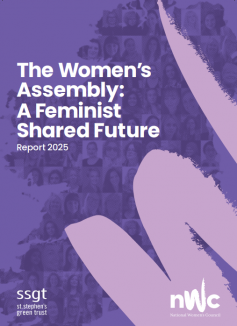Women must be key architects of Ireland’s future
Published: Thursday, March 06, 2025

Since the Brexit referendum in 2016, conversations about the constitutional future of the island of Ireland have gained momentum. In this pivotal time, women must be key architects of Ireland’s future and the crucial issues they are facing, such as the unequal sharing of care work, economic inequality and violence, must be central to any constitutional debate going forward.
These are some of the key findings of the new report ‘A Shared Feminist Future’ that the National Women’s Council (NWC) launched in the Mansion House, Dublin oday to mark International Women’s Day this week. The report presents the key findings and recommendations of the Women’s Assembly, chaired by former President Mary McAleese.
Held over two days (5th November 2024 and 12th February 2025) the Women’s Assembly, brought together 50 women thought leaders from across the island. It provided a deliberative, inclusive, and safe space for women to engage in discussions about Ireland’s future. The Women’s Assembly specifically included perspectives from marginalised voices that are too often absent from mainstream political conversations.
The report highlights the benefits of ‘safe’ spaces like the Women’s Assembly that enable Constitutional conversations that move beyond the binary debates on reunification or remaining in the UK, looking ahead at the broader social, economic, and political changes needed to build a more just and equal society. Rather than seeking to arrive at a single position on the constitutional future of the island, it emphasises the need to focus on core feminist values, such as equality, justice, and inclusivity as fundamental guiding principles in shaping a shared future.
The report identifies shared challenges that women face, no matter their background, including gender-based violence, an unequal sharing of care work and lack of political representation.
The report calls on decision makers North and South to ensure women’s full participation in shaping constitutional discussions and to invest in deliberative processes like the Women’s Assembly that acknowledge the multiple and diverse identities of people who call this island home.
Giving the keynote address at the launch of the report today, Neale Richmond, Minister of State at the Department of Foreign Affairs with special responsibility for International Development and Diaspora said:
“It is a privilege to address the Women’s Assembly today, in celebration of International Women’s Day. The Assembly has sought to challenge the historical exclusion of women in discussions on the island's political and social future. Gender equality and the empowerment of women and girls is also a cornerstone of Ireland’s foreign policy and one of the fundamental aspects in achieving Ireland’s goal of a more equal, peaceful and sustainable world. The full, equal and meaningful participation of women in political, social and economic decision making is essential to foster inclusive resilient societies.”
Rachel Coyle, Head of Campaigns and Mobilisation with NWC said,
"Too often, national debates on constitutional change are framed as divisive, dominated by male voices, leaving women’s perspectives marginalised or overlooked. But this conversation is happening, and women must be part of it. The Women’s Assembly showed that when women come together in spaces of open dialogue, healing, and shared learning, they bring a new dimension to the debate, one that moves beyond division and toward transformation. To make this possible, the Irish government must invest in spaces where women can share their concerns, hopes, and visions for the future. This is a crucial moment to ensure that feminist values, lived experiences, and the collective power of those too often excluded are at the heart of shaping Ireland’s future."
Aoife Clements, CEO of 50:50NI said,
“The Women's Assembly has been a unique and innovative opportunity to reflect on the status of women on the island of Ireland and the barriers and oppression that women on the island have and continue to face. As an innovative forum it allowed leading activists, academics and change-makers in this space to collaborate and imagine a future Ireland where gender, race, class and other forms of oppression are at the centre of policy making and public life.”
The launch of the Women’s Assembly report was hosted by Lord Mayor of Dublin, Emma Blain. A number of Women’s Assembly participants took part in a panel discussion, including Andrée Murphy, CEO, Relatives for Justice; Aoife Clements, 5050NI; Marie Elena Costa Sa, Irish Network against Racism; Kelsey Doyle, Belong To; Leanne Abernathy, Women in Loyalism,
The Women’s Assembly was part of the National Women’s Council ‘A Feminist Shared Future’ initiative, supported by the St Stephen’s Green Trust.
Link to the full report is available here: https://www.nwci.ie/images/uploads/CG_NWC0001_Assembly_Report_2025_A4_Booklet_24pp_DIGITAL.pdf
